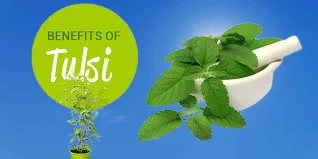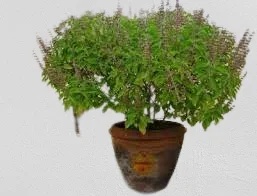Tulsi or Holy Basil or tulasi, is an aromatic perennial plant. It is native to the Indian subcontinent and widespread as a cultivated plant throughout the Southeast Asian tropics. It is cultivated for religious and traditional medicine purposes, and also for its essential oil. Of all the herbs used within Ayurveda, tulasi is preeminent, and scientific research is now confirming its beneficial effects.
Health Benefits of Tulsi
Health Benefits of Tulsi
There is mounting evidence that tulasi can address physical, chemical, metabolic and psychological stress through a unique combination of pharmacological actions. Tulasi or Holy Basil has been found to protect organs and tissues against chemical stress from industrial pollutants and heavy metals, and physical stress from prolonged physical exertion, ischemia, physical restraint and exposure to cold and excessive noise.
Tulsi has also been shown to counter metabolic stress through normalization of blood glucose, blood pressure and lipid levels, and psychological stress through positive effects on memory and cognitive function and through its anxiolytic and anti-depressant properties. It is widely used as a herbal tea, commonly used in Ayurveda, and has a place within the Vaishnava tradition of Hinduism, in which devotees perform worship involving holy basil plants or leaves.
Tulasi’s broad-spectrum antimicrobial activity, which includes activity against a range of human and animal pathogens, suggests it can be used as a hand sanitizer, mouthwash and water purifier as well as in animal rearing, wound healing, the preservation of food stuffs and herbal raw materials and traveler’s health.

Cultivation of Holy Basil plants has both spiritual and practical significance that connects the grower to the creative powers of nature, and organic cultivation offers solutions for food security, rural poverty, hunger, environmental degradation and climate change.
The use of tulasi in daily rituals is a testament to Ayurvedic wisdom and provides an example of ancient knowledge offering solutions to modern problems.
We are in the midst of a global pandemic of obesity, diabetes, cancer, dementia, depression and other chronic diseases caused by modern lifestyles and their associated lack of physical activity, high intake of sugar, fat, salt, alcohol and tobacco and exposure to a toxic cocktail of industrial chemicals. The solutions to this current health crisis are therefore more likely to be found in the homes and behaviors of individuals than in medical clinics, hospital or pharmacies.
As a science of life and the world’s oldest medical system, Ayurveda has a holistic approach to health and disease that focuses on preserving and promoting good health and preventing disease through healthy lifestyle practices. These practices include consumption of fresh, minimally processed foods, the use of Rasayanas (formulas) that eradicate ageing and disease, sophisticated detoxification practices and regular consumption of adaptogenic herbs that enhance the body’s capacity to maintain balance in the midst of a variety of stressors.
Ayurveda’s use of medicinal and culinary herbs draws upon India’s incredible biodiversity with a variety that is unsurpassed by any medical system; yet, of all the herbs used, none has a status comparable to tulsi or holy basil (Ocimum sanctum).
Tulsi/Tulasi/Holy Basil
Within Ayurveda, tulsi is known as “The Incomparable One,” “Mother Medicine of Nature” and “The Queen of Herbs,” and is revered as an “elixir of life” that is without equal for both its medicinal and spiritual properties.

Within India, tulasi has been adopted into spiritual rituals and lifestyle practices that provide a vast array of health benefits that are just beginning to be confirmed by modern science. This emerging science on tulasi, which reinforces ancient Ayurvedic wisdom, suggests that tulsi is a tonic for the body, mind and spirit that offers solutions to many modern day health problems.
Tulsi tastes hot and bitter and is said to penetrate the deep tissues, dry tissue secretions and normalize kapha and vata. Daily consumption of it is said to prevent disease, promote general health, wellbeing and longevity and assist in dealing with the stresses of daily life. It is also credited with giving luster to the complexion, sweetness to the voice and fostering beauty, intelligence, stamina and a calm emotional disposition.
In addition to these health-promoting properties, tulsi is recommended as a treatment for a range of conditions including anxiety, cough, asthma, diarrhea, fever, dysentery, arthritis, eye diseases, otalgia, indigestion, hiccups, vomiting, gastric, cardiac and genitourinary disorders, back pain, skin diseases, ringworm, insect, snake and scorpion bites and malaria.
Studies reveal that tulasi has a unique combination of actions that include: Antimicrobial (including antibacterial, antiviral, antifungal, antiprotozoal, antimalarial, anthelmintic), mosquito repellent, anti-diarrheal, anti-oxidant, anti-cataract, anti-inflammatory, chemopreventive, radioprotective, hepato-protective, neuro-protective, cardio-protective, anti-diabetic, anti-hypercholesterolemia.
It also has a combination of actions like anti-hypertensive, anti-carcinogenic, analgesic, anti-pyretic, anti-allergic, immunomodulatory, central nervous system depressant, memory enhancement, anti-asthmatic, anti-tussive, diaphoretic, anti-thyroid, anti-fertility, anti-ulcer, anti-emetic, anti-spasmodic, anti-arthritic, adaptogenic, anti-stress, anti-cataract, anti-leukodermal and anti-coagulant activities. These pharmacological actions help the body and mind cope with a wide range of chemical, physical, infectious and emotional stresses and restore physiological and psychological function.
Nutritional Value
| Nutritional Value | Amount per 100g serving | Percentage of Daily Required Intake |
| Calories | 22 | |
| Total fats | 0.6 g | 0% |
| Saturated fats | 0 g | 0% |
| Cholesterol | 0 g | 0% |
| Total Carbohydrates | 2.7 g | |
| Dietary fibre | 1.6 g | 6% |
| Sugars | 0.3 g | |
| Protein | 3.2 g | 6% |
| Sodium | 4 mg | 0% |
| Potassium | 295 mg | 8% |
| Iron | 17% | |
| Magnesium | 16% | |
| Calcium | 17% | |
| Vitamin C | 30% | |
| Vitamin B6 | 10% | |
| Vitamin D | 0% |
Also Tulasi ( an aromatic herb ) is a good source of:
- Vitamin A
- Vitamin C
- Vitamin K
- Iron
- Zinc
- Calcium
- Manganese
20 important benefits
1- Natural Immunity Booster. Tulsi is rich in Vitamin C and zinc. It thus acts as a natural immunity booster and keeps infections at bay.
2 – Reduces Fever (antipyretic) & Pain(analgesic). Tulsi has many potential germicides, fungicides, and anti-bacterial properties. These properties are excellent for resolving fever. Tulsi has the potential to cure fever and infections.
3 – Reduces Cold, Cough & Other Respiratory Disorders

4 – Reduces Stress & Blood Pressure. Tulsi helps reduce the expected levels of stress or cortisol in the body. The tulsi leaves have powerful adaptogen properties and can regulate blood circulation and beat free radicals, reducing the episode of stress. People who have high levels of stress can chew about 12 leaves of tulsi a day to reduce stress.
5 – Anti-cancer properties. The presence of phytochemicals in tulsi leaves helps to prevent the risk of various types of cancers like lung cancer, oral cancer, skin cancer, and liver cancer. These leaves are full of antioxidants that help prevent cancer.
6 – Good for Heart Health. These leaves have the potential to reduce blood lipid content and prevent the chances of stroke, ischemia, and hypertension. All thanks to its antioxidant properties.
7 – Good for Diabetes Patients. Tulsi leaves are remarkable when it comes to regulating blood sugar levels. This Ayurvedic herb helps regulate blood sugar levels by increasing the metabolism of the body.
8 – Useful in Kidney stones & Gouty Arthritis. Tulsi leaves or holy basil is also helpful in reducing uric acid levels in the body and preventing the formation of kidney stones. These leaves are especially beneficial for patients suffering from Gout and arthritis due to their diuretic properties.
9 – Help to cure indigestion and loss of appetite.
10 – Useful for skin and hair health. Being rich in antioxidants, these leaves help prevent premature aging and hair loss. They also prevent dandruff and fungus. Tulsi leaves have many benefits, including having the property to supply your body with purifying properties. This property helps remove toxins in the blood and acne and blemishes. In addition, it gives skin a beautiful gown and helps promote hair growth. Moreover, it helps reduce the itchiness of the scalp and reduce hair fall. Eating tulsi leaves, drinking its juice, or applying it with the help of a face mask are all great options to get healthy skin and hair growth.
11 – Dried Tulsi leaves can Acts as an Insect Repellent
12 – Can be applied in case of insect bites.
13 – Natural Blood purifier. The holy basil is a wonderful natural blood purifier too just like neem leaves. It helps to flush out the toxins from the digestive system. If consumed daily tulsi leaves purify the blood.
14 – Useful for Oral and Dental Health
15 – Treatment of Eczema, itching and irritation.
16 – Reduces Stress & Fatigue. Perhaps one of the most potent benefits of eating tulsi leaves comes from the plant’s anti-stress properties. Every part of the tulsi plant acts as an adaptogen, a natural substance that assists your body in adapting to stress and encourages mental balance. The Journal of Ayurveda and Integrative Medicine states that tulsi has anti-depressant and anti-anxiety properties. Ayurveda recommends drinking tea with tulsi leaves for a calming day that is free from stress.
17 – Protection against infection and treating wounds. Tulsi is long known to have anti-inflammatory properties and anti-bacterial, anti-fungal and anti-viral properties. It can also act as a painkiller. The anti-microbial properties of tulsi make it highly effective against several infections. Applying tulsi oil or tulsi paste to the affected area can prevent infections. Tulsi can potentially also help with healing wounds as it comes with anti-inflammatory and pain-relieving properties.
18 – Tulsi leaves benefits to involve removing toxins caused by smoking cigarettes. The tulsi leaves can also provide a cooling effect to your body.
19 – Lowers Cholesterol. Tulsi plant is known to target metabolic stress in an individual. Because of this, it can help an individual with weight loss and managing their cholesterol levels. In older patients suffering from a metabolic disease, tulsi helps in decreasing total, LDL, and VLDL cholesterol. Maintaining your cholesterol is essential as it can lead to serious heart ailments.
20 – Tulsi has been found to protect organs and tissues against chemical stress from industrial pollutants and heavy metals, and physical stress from prolonged physical exertion, ischemia, physical restraint and exposure to cold and excessive noise.
How to take Tulsi/Tulasi/Holy Basil?
As an old practice, Tulasi leaves can be taken directly by chewing or in liquid drop forms. However below are some homely methods to use.
• In the case of sore throat, boil the water with Tulasi leaves and take as a drink. This water can also be used as gargle.
• Take decocotion of Tulasi leaves with honey and ginger will act as an effective remedy for bronchitis, asthma, cough and cold.
• To get immediate relief fom influenza, take Tulasi leaves, cloves and some salt boil it in 1/2 liter of water till only the water are left and take it as a drink.
• In case of kidney stones, take the juice of Tulasi leaves and honey regularly for 6 months it will expel the stones via urinary tract.
• Take 12 leaves of Tulasi twice a day to prevent from stress and also purifies the blood.
• To cure ulcer and mouth infections take a few Tulsi leaves and chew them for some days.
• To cure the insect stings or bites, take a teaspoonful of fresh juice of Tulasi leaves or paste of fresh roots and apply it on the effected skin.
• Consume the juice of the leaves which is the beneficial in the treatment of ringworms and other skin diseases.
• Take Tulasi leaves dry in sun and make powder, can use it for brushing teeth.
• Take Tulasi leaves mix with mustered oil and make paste. Use it as toothpaste that hepls to maintain good dental health and massage it to the gums.
• To get relief from headache take decoction of Tulasi leaves internally.
• Pound the Tulsi leaves mix it with sandal wood paste and apply it on the forehead to reduce over heat and headache.
• Take 2 drops of black Tulsi leaves juice and put into eyes daily at bedtime which is an effective remedy for sore eyes and night blindness.
• To get relief from pain due to burns, apply the juice mixed with equal amount of coconut oil on the burns.
• To get quick relief from itching apply the juice mix with lemon on the areas.
• Take paste of Tulasi, hibiscus (gurhal) and neem leaves and apply it to the hair to keep it healthy and itch free.
Thanks for visiting read4knowledge.

